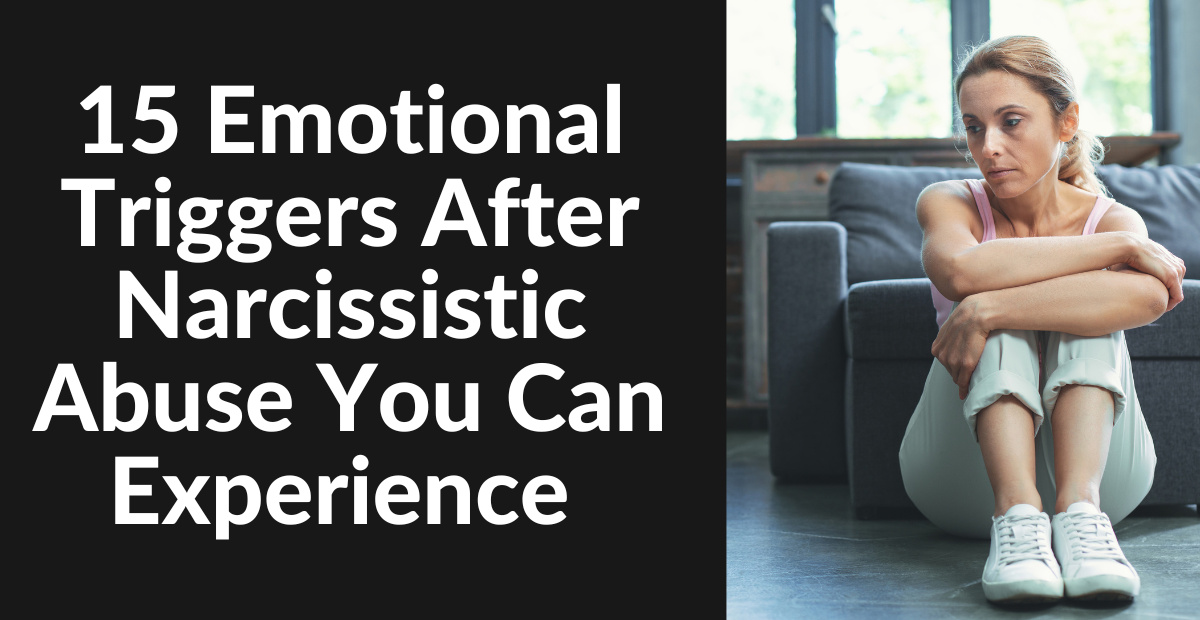Navigating life after narcissistic abuse can be a challenging and emotionally turbulent journey. Survivors of such abuse often find themselves experiencing a wide range of emotional triggers after narcissistic abuse that can significantly impact their well-being and day-to-day functioning.
Understanding these triggers and learning how to manage them is crucial for healing and reclaiming one’s life. In this article, we will explore some common emotional triggers experienced by individuals after narcissistic abuse and discuss effective strategies for coping and recovery.
Understanding Narcissistic Abuse
Narcissistic abuse refers to a pattern of manipulative and controlling behaviors inflicted by individuals with narcissistic personality disorder (NPD) or narcissistic traits. Survivors of narcissistic abuse often endure emotional, psychological, and sometimes physical harm.
The effects of this abuse can be long-lasting, impacting various aspects of a person’s life, including their emotional well-being, self-esteem, and ability to trust others.
15 Common Emotional Triggers After Narcissistic Abuse

Here is a list of emotional triggers after narcissistic
1. Betrayal and Broken Trust
One of the most profound emotional triggers for survivors of narcissistic abuse is the deep sense of betrayal and broken trust. The realization that someone they cared for and trusted has intentionally caused harm and exploited their vulnerabilities can be devastating.
2. Fear and Anxiety
Survivors may experience intense fear and anxiety as a result of the trauma they have endured. The fear of encountering similar abusive situations or being unable to protect themselves can be overwhelming, leading to hypervigilance and constant worry.
3. Anger and Resentment
Feelings of anger and resentment towards the abuser are common emotional triggers. Survivors may struggle with processing the injustice and cruelty they experienced, leading to anger that needs to be acknowledged and appropriately expressed.
4. Shame and Self-Blame
Narcissistic abusers often manipulate their victims into believing that the abuse is their fault. This can lead to deep-rooted shame and self-blame, making survivors feel unworthy and responsible for the mistreatment they endured.
5. Guilt and Second-Guessing
Survivors may experience guilt and second-guessing their decisions or actions during the abusive relationship. The abuser’s gaslighting tactics and manipulation often make it challenging to trust one’s judgment and can perpetuate self-doubt.
6. Isolation and Loneliness
Narcissistic abusers frequently isolate their victims from friends, family, and support systems, leaving them feeling lonely and cut off from social connections. This isolation can trigger feelings of despair and intensify emotional distress.
7. Hypervigilance and Fear of Future Relationships
After narcissistic abuse, survivors may become hypervigilant and overly cautious in their interactions with others. The fear of falling into another abusive relationship can make it difficult for them to trust and form healthy connections.
8. Emotional Flashbacks
Emotional flashbacks are intense and overwhelming emotional experiences triggered by reminders of past trauma. Survivors may re-experience the emotions they felt during the abusive relationship, leading to distress and a sense of helplessness.
9. Depression and Hopelessness
The cumulative effects of narcissistic abuse can contribute to feelings of depression and hopelessness. Survivors may struggle with low mood, loss of interest, and a diminished sense of hope for the future.
10. Low Self-Esteem and Self-Worth
Narcissistic abuse can significantly damage an individual’s self-esteem and self-worth. Survivors often internalize the negative messages and criticisms received from the abuser, leading to a distorted self-perception and diminished self-confidence.
11. Difficulty Establishing Boundaries
Survivors of narcissistic abuse may find it challenging to establish and maintain healthy boundaries in relationships. The blurred boundaries experienced during the abusive relationship can make it difficult to assert personal needs and protect oneself from potential harm.
12. People-Pleasing Behavior
As a result of the conditioning and manipulation by the abuser, survivors may develop people-pleasing behaviors. They may prioritize others’ needs over their own, seeking validation and approval as a means to avoid conflict and further abuse.
13. Fear of Rejection and Abandonment
Survivors may struggle with a fear of rejection and abandonment, stemming from the emotional abandonment experienced during the abusive relationship. This fear can hinder their ability to form and maintain secure and healthy relationships.
14. Trust Issues
Narcissistic abuse shatters trust, making it challenging for survivors to trust others. Rebuilding trust takes time and healing, as they learn to differentiate between healthy and toxic individuals.
15. Emotional Numbness and Detachment
In an attempt to protect themselves from further emotional pain, survivors may experience emotional numbness and detachment. This emotional disconnection can impact their ability to experience joy, intimacy, and emotional connection with others.
Valuable Readings
- 20 Examples Of Narcissistic Abuse In Relationships
- What is Cycle of Narcissistic Abuse And How To Break?
- Can Narcissistic Abuse Cause Brain Damage
- 9 Signs Of Narcissistic Abuse in Relationships
Coping Strategies for Emotional Triggers After Narcissistic Abuse
Recovering from narcissistic abuse requires implementing effective coping strategies to navigate the emotional triggers that may arise. Here are some strategies to consider:
- Seek Support from Trusted Individuals: Reach out to friends, family, or support groups who understand and validate your experiences.
- Engage in Self-Care Practices: Prioritize self-care activities that promote relaxation, stress reduction, and overall well-being.
- Establish Healthy Boundaries: Learn to set clear and assertive boundaries to protect yourself from future harm.
- Practice Mindfulness and Grounding Techniques: Cultivate present-moment awareness and grounding exercises to manage anxiety and intrusive thoughts.
- Explore Therapy and Counseling: Consider seeking professional help from therapists experienced in trauma and abuse recovery.
- Journaling and Expressive Writing: Engage in journaling or expressive writing as a means of processing emotions, gaining insights, and promoting healing.
- Engage in Creative Outlets: Explore creative activities such as art, music, or dance, which can serve as therapeutic outlets for self-expression.
- Develop a Supportive Network: Surround yourself with a supportive network of individuals who uplift and validate your experiences.
- Educate Yourself on Narcissistic Abuse: Learn about the dynamics of narcissistic abuse to gain clarity and understanding of your experiences.
- Prioritize Your Physical and Emotional Well-Being: Take care of your physical health by engaging in regular exercise, maintaining a balanced diet, and getting enough rest. Attend to your emotional well-being by practicing self-compassion and self-care.
- Set Realistic Expectations for Healing: Recognize that healing takes time and be patient with yourself throughout the recovery process.
- Practice Self-Compassion and Forgiveness: Be kind to yourself and work towards forgiving yourself for any perceived shortcomings or mistakes.
- Embrace Healthy Relationships: Surround yourself with individuals who respect and value you, fostering healthy and reciprocal connections.
- Consider Professional Help for Complex Trauma: If you are struggling with complex trauma, seek specialized therapeutic support to address the specific challenges associated with it.
- Celebrate Your Progress and Resilience: Acknowledge and celebrate the progress you have made in your healing journey, honoring your resilience and strength.
FAQS About Emotional Triggers After Narcissistic Abuse
How long does it take to recover from narcissistic abuse?
The recovery process varies for each individual and depends on various factors. It can take months or even years to heal from the effects of narcissistic abuse fully.
Is it possible to have a healthy relationship after narcissistic abuse?
Yes, it is possible to have healthy relationships after narcissistic abuse. With healing, self-awareness, and setting healthy boundaries, survivors can establish fulfilling and mutually respectful connections.
Last words
Recovering from narcissistic abuse is a complex and transformative process. The emotional triggers that survivors experience can be overwhelming, but with the right strategies and support, healing is possible.
By understanding the common emotional triggers and implementing effective coping strategies, survivors can reclaim their lives, rebuild their self-esteem, and establish healthy relationships based on trust and mutual respect.
